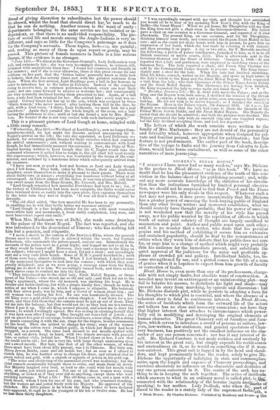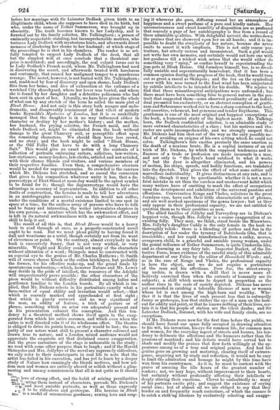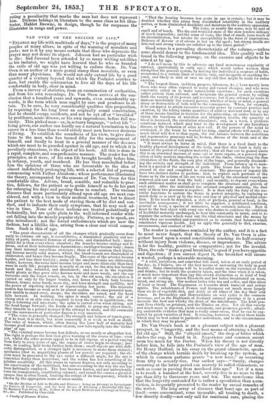DICKENS'S BLEAK HOUSE..
"I BELIEVE I have never had so many readers," says Mr. Dickens in the preface to Bleak House, "as in this book." We have no doubt that he has the pleasantest evidence of the truth of this con- viction in the balance-sheet of his publishing-account ; and, with- out any more accurate knowledge of the statistics of his circula- tion than the indications furnished by limited personal observa- tion, we should not be surprised to find that Punch and the Times newspaper were his only rivals in this respect. Whatever such a fact may not prove, it does prove incontestably that Mr. Dickens has a greater power of amusing the book-buying public of England than any other living writer ; and moreover establishes, what we should scarcely have thought probable, that his power of amusing is not weakened now that the novelty of his style has passed away, nor his public wearied by the repetition of effects in which truth of nature and sobriety of thought are largely sacrificed to mannerism and point. Author and public react upon each other ; and it is no wonder that a writer, who finds that his peculiar genius and his method of exhibiting it secure him an extensive and sustained popularity, should be deaf to the remonstrances of critics when they warn him of defects that his public does not care for, or urge him to a change of method which might very probably thin his audience for the immediate present, and substitute the quiet approval of the judicious for the noisy and profitable ap- plause of crowded pit and gallery. Intellectual habits, too, be- come strengthened by use, and a period comes in the life of a man of genius when it is hopeless to expect from him growth of faculty or correction of faults.
Bleak House is, even more than any of its predecessors, charge- able with not simply faults, but absolute want of construction. A. novelist may invent an extravagant or an uninteresting plot—may fail to balance his masses, to distribute his light and shade—may prevent his story from marching, by episode and discursion : but Mr. Dickens discards plot, while he persists in adopting a form for his thoughts to which plot is essential, and where the absence of a 'coherent story is fatal to continuous interest. In Bleak louse, the series of incidents which form the outward life of the actors and talkers has no close and necessary connexion; nor have they that higher interest that attaches to circumstances which power- fully aid in modifying and developing the original elements of human character. The great Chancery suit of Jarndyce and Jarn- dyce, which serves to introduce a crowd of persons as suitors, law- yers, law-writers, law-stationers, and general spectators of Chan- cery business, has positively not the smallest influence on the cha- racter of any one person concerned ; nor has it any interest of it- self. Mr. Richard Carstone is not made reckless and unsteady by his interest in the great suit, but simply expends his recklessness and unsteadiness on it, as he would on something else if it were non-existent. This great suit is lugged in by the head and shoul- ders, and kept prominently before the reader, solely to give Mr. Dickens the opportunity of indulging in stale and commonplace satire upon the length and expense of Chancery proceedings, and exercises absolutely no influence on the characters and destinies of any one person concerned in it. The centre of the arch has no- thing to do in keeping the arch together. The series of incidents which answers to what in an ordinary novel is called plot, is connected with the relationship of the heroine (again analsiarIa of speaking) to her mother. Lady Dedlock, who when fir._ „art of duced to the reader is a stately lady of the snpremest fas -ath, a r • Bleak House. By Charles Dickens. Published by Bradbury and Evans.1 the Ith before her marriage with Sir Leicester Dedlock given birth to an illegitimate child, whom she supposes to have died in its birth, but who, under the name of Esther Summerson, was brought up in obscurity. The truth becomes known to her Ladyship, and is ferreted out by the family solicitor' Mr. Tulkinghorn ; a person of eminently respectable standing, but incomprehensible motives, who tortures Lady Dedlock with mysterious hints, and afterwards direct menaces of disclosing her shame to her husband ; at which stage of the proceedings he is shot in his chambers. The reader is so art- fully tempted to suspect Lady Dedlock of the deed, that all but the simplest will at once conclude that a theatrical sur- prise is meditated; and accordingly, the real culprit turns out to be Lady Dedlock's French maid, whom Mr. Tulkinghorn had used in discovering the secret, and afterwards treated with harshness and contumely, that roused her malignant temper to a murderous revenge. The secret, however, is not buried with Mr. Tulkinghorn ; and, maddened by fear of discovery and open shame, Lady Dedlock flies from her home, and dies of exhaustion at the entrance of a wretched City churchyard, where her lover was buried, and where she is found by her daughter and a detective policeman who had been sent in quest of her. Literally, we have here given the whole of what can by any stretch of the term be called the main plot of Bleak House. And not only is this story both meagre and melo- dramatic, and disagreeably reminiscent of that vilest of modern books Reynolds's Mysteries of _London, but it is so unskilfully managed that the daughter is in no way influenced either in character or destiny by her mother's history ; and the mother, her husband, the prying solicitor, the -French maid, and the whole Dedlock set, might be eliminated from the book without damage to the great Chancery snit, or perceptible effect upon the remaining characters. We should then have less crowd, and no story ; and the book might be called "Bleak House, or the Odd Folks that have to do with a long Chancery Suit." This would give an exact notion of the contents of a collection of portraits embracing suitors' solicitors, law-writers, law-stationers, money-lenders, law-clerks, articled and not-articled, with their chance friends and visitors, and various members of their respective families. Even then, a comprehensive etcsetera would be needed for supernumeraries. So crowded is the canvass which Mr. Dickens has stretched, and so casual the connexion that gives to his composition whatever unity it has, that a da- guerreotype of Fleet Street at noon-day would be the aptest symbol to be found for it ; though the daguerreotype would have the advantage in accuracy of representation. In addition to all other faults of construction, the heroine is made to tell her adventures in an autobiographic narrative ; and as this would not suffice, under the conditions of a mortal existence limited to one spot in space at a time, for the endless array of persons who have to talk and be funny and interesting, the writer intercalates chapters in his own person,—a mixture which has the awkwardest effect, and is left in its natural awkwardness with no appliances of literary skill to help it out.
The result of all this is, that Bleak _House would be a heavy book to read through at once, as a properly-constructed novel ought to be read. But we must plead guilty to having found it dull and wearisome as a serial, though certainly not from its want of cleverness or point. On the contrary, almost everybody in the book is excessively funny, that is not -very wicked, or very miserable. Wright and Keeley could act many of the characters without alteration of a word; Skimpole must be constructed with an especial eye to the genius of Mr. Charles Mathews ; 0. Smith will of course choose Krook or the sullen bricklayer, but probably the former, for his effective make-up, and the grand finale by spontaneous combustion,—which, however Nature and Mr. Lewes may deride in the pride of intellect, the resources of the Adelphi will unquestionably prove possible : the other characters of the piece would be without difficulty distributed among ladies and gentlemen familiar to the London boards. By all which is im- plied, that Mr. Dickens selects in his portraiture exactly what a farce-writer of equal ability and invention would select,—that which is coarsely marked and apprehended at first sight ; that which is purely outward and no way significant of the man, an oddity of feature, a trick of gesture or of phrase, something which an actor can adequately present and in his presentation exhaust the conception. And this ten- dency to a theatrical method shows itself again in the exag- gerated form which his satire assumes, and which even when the satire is well directed robs it of its wholesome effect. The theatre is obliged to drive its points home, or they would be lost ; the ma- jority of our actors want skill to present a character coloured and drawn true to nature, and a London mixed audience would not appreciate the exquisite art that disdained coarse exaggeration. But the gross caricature of the stage is unbearable in the study : we read with some other purpose than to laugh ; and if the Harold Skimpoles and Mrs. Jellybys of the novel are supremely ridiculous, we only refer to their counterparts in real life to note that the artist has failed in his execution, and has yet to learn by a deeper study of Nature how cunningly she blends motives, and how sel- dom men and women are entirely absurd or selfish without a glim- mering and uneasy consciousness that all is not quite as it should be.
ne love of strong effect, and the habit of seizing peculiarities
allu.
This ismting them instead of characters, pervade Hr. Dickens's
w, and most amiable portraits, as well as those expressly
L. a to be ridiculous and grotesque. His heroine in Bleak mr, is a model of unconscious goodness; sowing love and reap- ing it wherever he goes, diffusing round her an atmosphere of happiness and a sweet perfume of a pure and kindly nature. Her unconsciousness and sweet humility of disposition are so profound that scarcely a page of her autobiography is free from a record of these admirable palities. With delightful naïveté she writes down the praises that are showered upon her on all hands ; and it is im- possible to doubt the simplicity of her nature, because she never omits to assert it with emphasis. This is not only coarse 'por- traiture, but utterly untrue and inconsistent. Such a girl would not write her own memoirs, and certainly would not bore one with her goodness till a wicked wish arises that she would either do something very "spicy," or confine herself to superintending the jam-pots at Bleak House. Old Jarndyce himself, too, is so dread- fully amiable and supernaturally benevolent, that it has been a common opinion during the progress of the book, that he would turn out as great a rascal as Skimpole; and the fox on the symbolical cover with his nose turned to the East wind has been conjectured by subtile intellects to be intended for his double. We rejoice to find that those misanthropical anticipations were unfounded; but there must have been something false to general nature in the por- trait that suggested them—some observed peculiarity of an indivi- dual presented too exclusively, or an abstract conception of gentle- ness and forbearance worked out to form a sharp contrast to the loud, self-assertive, vehement, but generous and tender Boythorne. This gentleman is one of the most original and happiest conceptions of the book, a humourist study of the highest merit. Mr. Milking- horn, the Dedlock confidential solicitor, is an admirable study of mere outward characteristics of a class ; but his motives and cha- racter are quite incomprehensible, and we strongly suspect that Mr. Dickens had him shot out of the way as the only possible me- thod of avoiding an enigma of his own setting which he could not solve. Tulkinghorn's fate excites precisely the same emotion as the death of a noxious brute. He is a capital instance of an old trick of Mr. Dickens, by which the supposed tendencies and in- fluences of a trade or profession are made incarnate in a man, and not only is "the dyer's hand subdued to what it works in," but the dyer is altogether eliminated, and his powers of motion, his shape, speech, and bodily functions, are translated into the dye-tub. This gives the effect of what some critics call marvellous individuality. It gives distinctness at any rate, and is telling ; though it may be questionable whether it is not a more fatal mistake in art than the careless and unobservant habit which many writers have of omitting to mark the effect of occupations upon the development and exhibition of the universal passions and affections. Conversation Kenge and Vholes, solicitors in the great Sarndyce case, have each their little characteristic set of phrases, and are well marked specimens of the genus lawyer ; but as they only appear in their professional capacity, we are not entitled to question them as to their qualities as men. The allied families of Jellyby and Turveydrop are in Dickens's happiest vein, though Mrs. Jellyby is a coarse exaggeration of an existing folly. They may, we think, stand beside the Micawbers. Mrs. Jellyby's daughter Caddy is the only female in the book we thoroughly relish : there is a blending of pathos and fun in the description of her under the tyranny of Borrioboola Gha, that is irresistible ; and her rapid transformation from a sulky, morose, overgrown child, to a graceful and amiable young woman, under the genial influence of Esther Summersoo, is quite Cinderella-like, and as charming as any fairy tale. Inspector Bucket, of the De- tective Force, bears evidence of the careful study of this admirable department of our Police by the editor of Household Words ; and, as in the ease of Kenge and Vholes, the professional capacity is here the object, and we do not require a portraiture of the man and his affections. Poor Yoe, the street-sweep- ing urchin, is drawn with a skill that is never more ef- fectively exercised than when the outcasts of humanity are its subjects; a skill which seems to depart in proportion as the author rises in the scale of society depicted. Dickens has never yet succeeded in catching a tolerable likeness of man or woman whose lot is cast among the high-born and wealthy. Whe- ther it is that the lives of such present less that is outwardly funny or grotesque, less that strikes the eye of, a man on the look- out for oddity and point, or that he knows nothing of their lives, cer- tain it is that his people of station are the vilest daubs; and Sir Leicester Dedlock, Baronet, with his wife and family circle, are no exceptions.
If Mr. Dickens were now for the first time before the public, we should have found our space fully occupied in drawing attention to his wit, his invention, his eye for common life, for common men and women, for the everyday aspect of streets and houses, his ten- dency to delineate the affections and the humours rather than the passions of mankind ; and his defects would have served but to shade and modify the praises that flow forth willingly at the ap- pearance among us of a true and original genius. And had his genius gone on growing and maturing, clearing itself of extrava- gance, acquiring art by study and reflection, it would not be easy to limit the admiration and homage he might by this time have won from his countrymen. As it is, he must be content with the praise of amusing the idle hours of the greatest number of readers ; not, we may hope, without improvement to their hearts, but certainly without profoundly affecting their intellects or deeply stirring their emotions. Clever he undoubtedly is : many of his portraits excite pity, and suggest the existence of crying social sins ; but of almost all we are obliged to say that they border on and frequently reach caricature, of which the essence is to catch a strileng likeness by exclusively selecting and exagge- rating a peculiarity that marks the man but does not represent him. Dickens belongs in literature to the same class as his illus- trator, Hablot Browne, in design, though he far surpasses the illustrator in range and power.




























 Previous page
Previous page